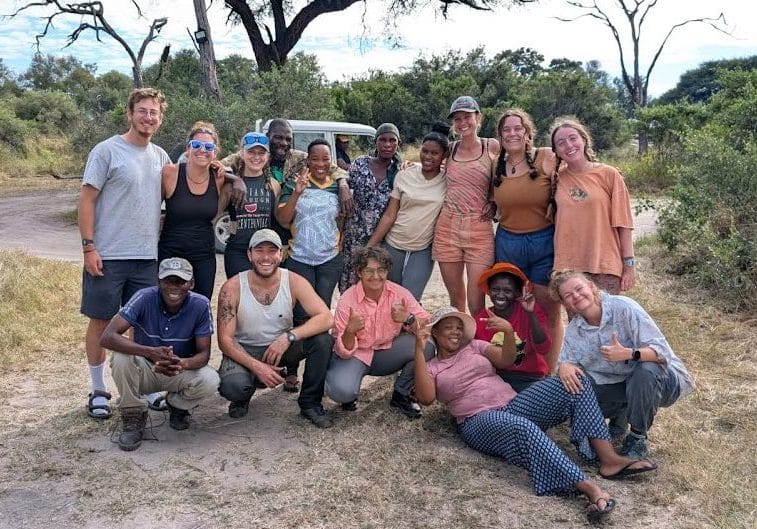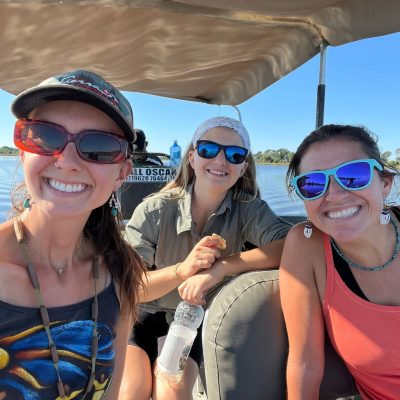Photo: Jenn (right) and Spring 2025 Botswana students.
When I started my Round River journey in 2005, I thought it would be a transformational several months. Little did I know how the program would be transformational to my life. Over the course of the semester, I gained valuable field experience with wildlife monitoring and working with communities to understand the complexities of human-wildlife interactions and dynamic ways to approach conservation. The biggest takeaways for me were the ability to work closely with the endangered black rhino and know that my work was actively contributing to helping the critically endangered species. But it was the approach to conservation through partnering directly with local communities to achieve these conservation goals that really influenced the trajectory of my career path. I knew I always wanted to work in wildlife conservation, but I didn’t realize until participating in Round River the critical and integral role of communities in conservation work. Not only did we work directly with the communities, we genuinely became part of the community, living and enjoying time together. Being able to get to know the families and children and building new friendships was so powerful and made it so hard to leave after the months immersed into the local culture and community.
It was this experience with Round River that led me to want to pursue the human dimensions of conservation and wildlife management and work more directly with communities. The experience also built a lifelong connection for me with Namibia and now other countries in southern Africa like Botswana and Zambia where I work directly with colleagues in those countries, engage with students, and am part of a consortium that is centered in a community of practice to empower the next generation of leaders in addressing complex social-ecological challenges in conservation. I can’t say enough how Round River changed my life both personally and professionally. The program really taught me the complexities of conservation, the importance of meaningful and genuine relationships, and the growth you can experience when you fully immerse yourself in a new culture and place.
Jenn Thomsen, Ph.D., is the Program Director of Parks, Tourism and Recreation Management at the University of Montana. In Spring 2025, she visited Round River’s Spring Botswana student program cohort in the field:
As part of a fellowship from University of Montana’s Global Engagement Office, I was able to spend several months in Namibia and Botswana working with partners from University of Namibia and University of Botswana’s Okavango Research Institute that are part of the INSAKA Consortium with University of Montana. We met with NGOs, community conservancies and trusts, government managers, researchers, and students to identify key challenges and opportunities in conservation, human-wildlife conflict, sustainability, climate change, and transboundary issues. Through this dialogue, I am working on proposals with partners to move these ideas forward in the future and continue the collaborative work in Botswana, Namibia, and the broader region. I am excited and thankful that this fellowship has further strengthened the relationship I have with current partners and provided an opportunity for new partnerships.
My time with Round River was a highlight to reconnect with an organization that has been transformative in my life personally and professionally and to spend time with the staff, students, and partners for two weeks in the Okavango Delta. I was so impressed with how well the program runs, the impact the program is providing to communities and wildlife conservation, and the depth of the discussions and hard work the students brought every day. I couldn’t be prouder to be an alumni of the program and my time with Round River has renewed my passion to stay engaged with the group and support their efforts in the future.



